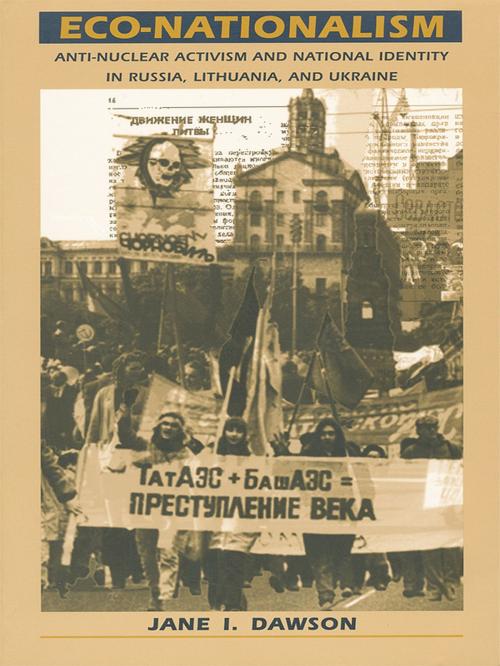Eco-Nationalism
Anti-Nuclear Activism and National Identity in Russia, Lithuania, and Ukraine
Nonfiction, Science & Nature, Technology, Nuclear Energy, History, Asian, Russia, Social & Cultural Studies, Political Science| Author: | Jane I. Dawson | ISBN: | 9780822377825 |
| Publisher: | Duke University Press | Publication: | August 12, 1996 |
| Imprint: | Duke University Press Books | Language: | English |
| Author: | Jane I. Dawson |
| ISBN: | 9780822377825 |
| Publisher: | Duke University Press |
| Publication: | August 12, 1996 |
| Imprint: | Duke University Press Books |
| Language: | English |
Eco-nationalism examines the spectacular rise of the anti-nuclear power movement in the former Soviet Union during the early perestroika period, its unexpected successes in the late 1980s, and its substantial decline after 1991. Jane I. Dawson argues that anti-nuclear activism, one of the most dynamic social forces to emerge during these years, was primarily a surrogate for an ever-present nationalism and a means of demanding greater local self-determination under the Soviet system. Rather than representing strongly held environmental and anti-nuclear convictions, this activism was a political effort that reflected widely held anti-Soviet sentiments and a resentment against Moscow’s domination of the region—an effort that largely disappeared with the dissolution of the USSR.
Dawson combines a theoretical framework based on models of social movements with extensive field research to compare the ways in which nationalism, regionalism, and other political demands were incorporated into anti-nuclear movements in Russia, Lithuania, Ukraine, Armenia, Tatarstan, and Crimea. These comparative case studies form the core of the book and trace differences among the various regional movements to the distinctive national identities of groups involved. Reflecting the new opportunities for research that have become available since the late 1980s, these studies draw upon Dawson’s extended on-site observation of local movements through 1995 and her unique access to movement activists and their personal archives.
Analyzing and documenting a development with sobering and potentially devastating implications for nuclear power safety in the former USSR and beyond, Eco-nationalism’s examination of social activism in late and postcommunist societies will interest readers concerned with the politics of global environmentalism and the process of democratization in the post-Soviet world.
Eco-nationalism examines the spectacular rise of the anti-nuclear power movement in the former Soviet Union during the early perestroika period, its unexpected successes in the late 1980s, and its substantial decline after 1991. Jane I. Dawson argues that anti-nuclear activism, one of the most dynamic social forces to emerge during these years, was primarily a surrogate for an ever-present nationalism and a means of demanding greater local self-determination under the Soviet system. Rather than representing strongly held environmental and anti-nuclear convictions, this activism was a political effort that reflected widely held anti-Soviet sentiments and a resentment against Moscow’s domination of the region—an effort that largely disappeared with the dissolution of the USSR.
Dawson combines a theoretical framework based on models of social movements with extensive field research to compare the ways in which nationalism, regionalism, and other political demands were incorporated into anti-nuclear movements in Russia, Lithuania, Ukraine, Armenia, Tatarstan, and Crimea. These comparative case studies form the core of the book and trace differences among the various regional movements to the distinctive national identities of groups involved. Reflecting the new opportunities for research that have become available since the late 1980s, these studies draw upon Dawson’s extended on-site observation of local movements through 1995 and her unique access to movement activists and their personal archives.
Analyzing and documenting a development with sobering and potentially devastating implications for nuclear power safety in the former USSR and beyond, Eco-nationalism’s examination of social activism in late and postcommunist societies will interest readers concerned with the politics of global environmentalism and the process of democratization in the post-Soviet world.















